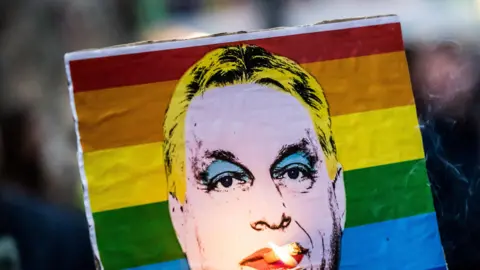Hungary Pride to go ahead, defying Orban threat of 'legal consequences'
 Reuters
ReutersA Budapest Pride march is expected to go ahead on Saturday, defying Hungarian Prime Minister Viktor Orban's legal threats against LGBTQ rights activists.
The march organisers hope for record attendance this year, despite mounting pressure from nationalist conservative politicians and police to stop any display of pro-LGBTQ material.
Police have issued a ban, in line with a new "child protection" law that restricts gatherings considered to be promoting homosexuality.
A day before the Pride, Orban downplayed the possibility of violent clashes between the police and participants - but warned those who go will face possible legal repercussions.
"Of course, the police could break up such events, because they have the authority to do so, but Hungary is a civilised country, a civic society. We don't hurt each other," he told state radio on Friday.
"There will be legal consequences, but it cannot reach the level of physical abuse."
Attendees risk a fine of up to €500 (£427; $586), with police empowered to use facial recognition technology to identify them.
Organisers could face a one-year prison sentence.
EU equalities commissioner Hadja Lahbib, a former Belgian foreign minister, is in Budapest and expected to join the march, along with dozens of MEPs.
On Friday, she posted a picture showing her standing with the liberal Budapest mayor Gergely Karacsony in front of a rainbow flag symbolising gay rights.
The Pride march "will be a powerful symbol of the strength of the civil society," she wrote on X.
Karacsony, a member of Hungary's opposition, has insisted no-one attending the march can face any reprisals as it has been co-organised by city hall, and as such is a municipal event that does not require police approval.
Ahead of the Pride, European Commission President Ursula von der Leyen asked the Orban government not to block the march.
Orban was unfazed, asking her "to refrain from interfering in the law enforcement affairs" of EU member countries.
